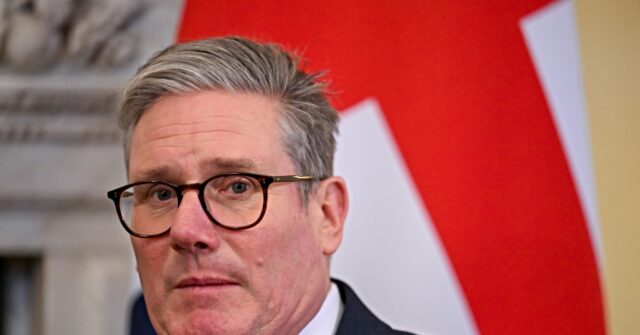The UK economy faced a significant downturn as it contracted for the second consecutive month through October, raising concerns about a looming recession. Official data from the Office for National Statistics (ONS) indicated that the country’s gross domestic product (GDP) shrank by 0.1 percent in October, matching the decline experienced in September. This economic slump coincided with the 100-day milestone of Prime Minister Sir Keir Starmer’s left-wing Labour government. The persistent decline in the economy suggests a worrying trend, impacting business confidence and highlighting challenges faced by the new administration.
The services sector, which represents a significant segment of the UK economy, exhibited no growth during this period, further underscoring the economic difficulties. Other industries, including production and construction, also reported contractions, indicating a widespread downturn. The BBC noted that various sectors, particularly hospitality, retail, and food services, experienced a “weak month,” reflecting the slowing economic activity across the nation. Such stagnation in key industries raises alarms about the overall health of the economy going forward.
With two consecutive months of negative GDP growth, the UK is inching closer to a technical recession, which is defined as experiencing two successive quarters of economic decline. Chancellor Rachel Reeves expressed disappointment over the latest figures but emphasized that the government has initiated policies aimed at fostering long-term economic growth. This focus on sustainable improvement highlights the administration’s intent to navigate through these challenging economic waters and potentially stimulate recovery in the future.
Experts have pointed to various factors contributing to this sluggish economic performance. KPMG’s chief economist, Yael Selfin, observed that uncertainty surrounding the upcoming Budget announcement on October 30 was causing businesses and consumers to restrain their spending. The cautious behavior of stakeholders in the economy reflects broader apprehensions about future economic policies and their potential impact. Additionally, analysis from Capital Economics revealed that the UK economy has only expanded once in the past five months, presenting a troubling picture that suggests broader structural issues beyond mere budgetary concerns.
Further complicating the economic landscape is the prolonged impact of relatively high interest rates, still set at 4.75 percent despite two cuts by the Bank of England this year. This situation indicates that the effects of elevated borrowing costs are persisting longer than previously anticipated, contributing to the economic malaise. Paul Dales, chief UK economist at Capital Economics, highlighted this factor as a significant obstacle that extends beyond the immediate challenges presented by the government’s budgetary policies.
In light of this latest economic setback, Prime Minister Starmer has also revised expectations regarding the party’s pre-election commitment to achieving the highest economic growth within the G7 nations, framing it as an “aim” rather than a definitive promise. This shift illustrates the government’s acknowledgment of the complexities involved in steering the economy back on track. As the UK grapples with mounting economic pressures, the focus remains on formative policies and strategic measures that could foster a more resilient economic environment moving forward.

